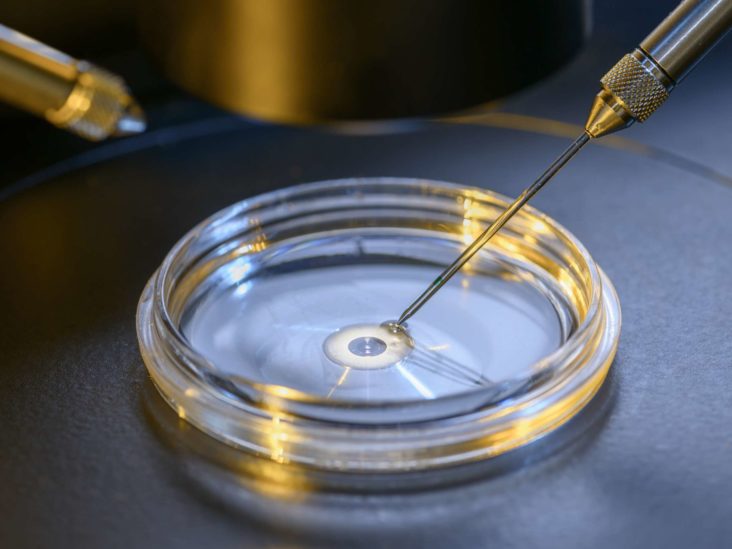Preimplantation Genetic Testing (PGT) is a fertility treatment that can be used to identify genetic abnormalities in embryos created with in vitro fertilization (IVF). PGT can be used to select embryos for transfer that are less likely to have genetic disorders, which can improve the chances of a successful pregnancy and reduce the risk of miscarriage.
This procedure is often considered for patients who have a history of issues including recurrent pregnancy losses (miscarriages), multiple unexplained failed IVF cycles, a prior pregnancy or child with certain chromosome abnormalities, and a family history of certain genetic disorders.
The PGT process can also be used for patients who are older or who have other risk factors for genetic disorders. The main types of PGT are PGT-A, PGT-M, and PGT-SR. The PGT-A (preimplantation genetic testing for aneuploidy) tests for the number of chromosomes in each embryo. This can help identify embryos with chromosome abnormalities, which are a leading cause of miscarriage and birth defects.
For PGT-M (preimplantation genetic testing for monogenic disorders), tests for specific genetic disorders that are known to run in the family. This can help select embryos that are free of these disorders.
The PGT-SR (preimplantation genetic testing for structural rearrangements, tests for structural rearrangements of chromosomes, which are changes in the structure of a chromosome. This can help to select embryos that are free of these rearrangements, which can lead to miscarriage or birth defects.
Essentially, PGT is typically performed at the blastocyst stage, which is on day five or six of development. A small number of cells are removed from the blastocyst and tested for genetic abnormalities. The blastocysts are then frozen until the results of the testing are available. Once the results are available, the healthiest embryos can be selected for transfer to the uterus.
A study published in the journal Fertility and Sterility shows that PGT can improve the chances of a live birth by up to 70 percent in women with recurrent pregnancy loss. The study also found that PGT can reduce the risk of miscarriage by up to 50 percent.
However, it is essential to note that PGT is not a guarantee of a successful pregnancy, but it can improve the chances of a healthy pregnancy. The relationship between PGT and fertility treatment is defined. It is performed after IVF and before embryo transfer. This allows doctors to select the healthiest embryos for transfer, which can improve the chances of a successful pregnancy.
One of the biggest advantages of utilizing PGT is that it improves the chances of a successful pregnancy. By helping to identify embryos that are less likely to have genetic abnormalities, we can improve the chances of a successful pregnancy and reduce the risk of miscarriage.
One other significant advantage is the reduced risk of having a child with a genetic disorder. It is widely known that PGT can be used to select embryos that are free of certain genetic disorders. This can reduce the risk of having a child with a genetic disorder, such as Down syndrome, cystic fibrosis, sickle cell anaemia, thalassemia and spinal muscular atrophy. It is also significant to note that PGT enables a reduced need for prenatal testing and invasive procedures, such as Amniocentesis and Chorionic villus sampling (CVS).
These procedures are used to test for genetic abnormalities in the fetus, but they carry a small risk of miscarriage. By testing embryos before they are transferred to the uterus, PGT can help identify embryos that are less likely to have genetic abnormalities, which can reduce the need for prenatal testing and invasive procedures.
The cost of PGT in Nigeria varies depending on the fertility clinic and the specific type of procedure that is being performed. The cost of PGT-A, which is the most common type of PGT, is generally affordable. In addition to the cost of PGT itself, there are also other costs associated with fertility treatment, such as the cost of IVF, medications, and other procedures. The affordability of PGT for couples in Nigeria depends on their individual financial situation. For some couples, PGT may be affordable, while for others, it may be out of reach.
Some people may not be able to undergo PGT for certain reasons, so if you are considering PGT, it is important to talk to your doctor about the risks and benefits of the procedure, as well as your individual eligibility. For instance, a woman with active pelvic inflammatory disease (PID) may not be able to undergo the procedure because PID can increase the risk of infection during the embryo biopsy procedure. Similarly, a woman with ovarian failure may not be able to undergo PGT because she will not be able to produce eggs for IVF. If a man has severe male factor infertility, PGT may be a challenge towards producing viable embryos and may require multiple IVF cycles.
The bottom line is that PGT is a powerful tool that can help people achieve their dream of parenthood. It can improve the chances of a successful pregnancy and reduce the risk of having a child with a genetic disorder.
The best part is its ability to help couples achieve their dream of having a healthy baby.





